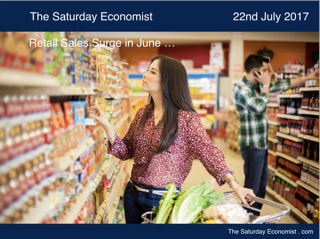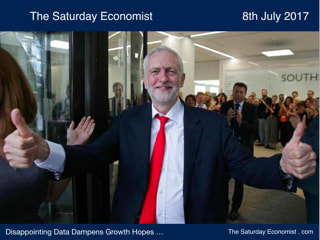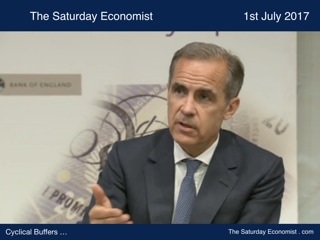 The preliminary estimate of GDP in the second quarter was released this week. Output growth increased by 1.7% in the period April to June, compared to the same period a year earlier. Is the growth rate slowing? Yes is the apparent answer. Compared to the first quarter of the year, growth has slowed from the 2% level reported in the period January to March 2017. In the first six months of 2016, growth averaged just under 1.7%. For the year as a whole the growth rate was 1.8%. So not much of a slow down in the economy as yet. Analyse the detail and service sector growth was 2.3%. Exclude the public sector, the private service sector growth rate was 2.7%. The volatile production and construction sectors inhibited growth overall. Construction growth increased by less than 1%. Manufacturing output increased by 0.3%. Mining and utilities output were down year on year. The sectors are volatile and subject to revision. For the year as a whole it seems reasonable to expect growth of around 1.7% to 1.9% despite the looming fears about any EU deal. Should we worry about growth in the UK this year? The IMF appear to think so. The IMF is warning about the UK current account deficit. The largest of the 44 countries under review, the current account deficit is 4.4% of GDP. The UK must bring down the trade deficit warns the IMF. Financing the deficit risks are "reduced" in the near term. Over the medium term, funding may become a more critical issue. Slower growth in the UK may suggest the Bank of England may have time to adjust the internal monetary framework. The IMF is giving a clear warning - matters may be taken out of local hands if there is no improvement in the fundamentals of external trade and finance. The Old Lady may be obliged to act to take away the punch bowl but the IMF will turn off the music .... for the moment, the ask is just to turn it down a little ... A Vision for Transition ... Theresa May is walking in the Alps, Boris Johnson is waking in Australia, Liam Fox is buying chickens in America. Time to close the borders and pull up the drawbridge. Certification and qualification may leave the absentees without sufficient immigration points to make the home run. For the moment it is left to the Chancellor Phillip Hammond and Amber Rudd to present the vision for transition. It's a sort of Free trade, inside the customs union, with free movement of labour, all subject to adjudication by the European Court of Justice. Excellent. It's a sort of "Status Quo Ante Referendum". All we need now is an indefinite rolling extension to the transition period for 2020 and beyond. Businesses can then relax and concentrate on more immediate matters in hand. Squaring the circle, inside a four dimensional cube, may seem more plausible, than a trade deal with the EU. A deal which will meet the conflicting ambitions of the Tory Party and the disparate objectives of the 27 member states. A transition offering Free Trade, inside the customs union which is not actually access to the single market inside a tariff wrapper, is the presentation pack to the back benches. Good luck with that. It is the silly season after all. The vision for transition would include a "back to the future" option, predating June 2016. As Phillip Hammond explained driving a train (and tardis presumably) is so easy even a woman can do it. Yep, and it's cheaper as the BBC demonstrates ... John That's all for this week. Have a great week-end ... Don't Miss the Economics Conference on the 13th October. Our theme is the Economics of Greater Manchester. We will be talking about the Inclusive Growth Challenge, Balancing the Books and the Sectors Driving Growth in the City Region! Another Great Conference in the pro-manchester series ... Book Now Don't Miss Out ... © 2017 John Ashcroft, Economics, Strategy and Social Media, experience worth sharing. ______________________________________________________________________________________________________________ The material is based upon information which we consider to be reliable but we do not represent that it is accurate or complete and it should not be relied upon as such. We accept no liability for errors, or omissions of opinion or fact. In particular, no reliance should be placed on the comments on trends in financial markets. The receipt of this email should not be construed as the giving of advice relating to finance or investment. ______________________________________________________________________________________________________________ If you do not wish to receive any further Saturday Economist updates, please unsubscribe using the buttons below or drop me an email at [email protected]. If you enjoy the content, why not forward to a friend, they can sign up here ... _______________________________________________________________________________________ For details of our Privacy Policy and our Terms and Conditions check out our main web site. John Ashcroft and Company.com _______________________________________________________________________________________________________________ Copyright © 2017 The Saturday Economist, All rights reserved. You are receiving this email as a member of the Saturday Economist Mailing List or the Dimensions of Strategy List. You may have joined the list from Linkedin, Facebook Google+ or one of the related web sites. Our mailing address is: The Saturday Economist, Tower 12, Spinningfields, Manchester, M3 3BZ, United Kingdom.
0 Comments
 Retail sales surged in June according to the latest ONS data. The volume of retail sales increased to 2.9% in the month. Sales value growth increased by almost 6%. In the first three months of the year, sales values increased by 5.7%, so much for the real income squeeze. The gloves are off and the wallets are open. Spending on clothing, textiles and footwear increased by over 6%. On line sales are booming. Internet sales increased by 15.9%, accounting for over 16% of all retail sales in the month. The data follows information on week pay growth, suggesting real incomes are under pressure. For the moment, the squeeze is having little effect on retail sales. The performance of Sterling is boosting tourist traffic and perhaps the high street spend. Inflation figures were a surprise for some this week. The headline rate CPI fell to 2.6% in June following an increase of 2.9% in May. Oil and the weakness of Sterling explain the surge in prices. Soft oil and a Sterling recovery explain the inflation mitigation. Goods inflation was up by 2.6%. Producer prices eased back to 3.3% Input costs fell below 10%. Inflation may have peaked in the first half of the year. The underlying service sector inflation at 2.7% in June, is a clear indication inflation will remain above target. The ECB made the call this week, to end QE and to call an end to the era of low rates in Europe. The MPC will herald the headline inflation drop as a reason to avoid a rise in base rates. Strong retail sales and underlying inflation rates suggest it is time to make the move. Unless pay rates rise, the MPC will be loathe to act ... Borrowing disappoints ... Government borrowing increased by almost £2 billion in the first three months of the year according to the official figures released this week. Borrowing in the month was £6.9 billion up from £4.8 billion prior year and was £22 billion in the year to date. Public sector net debt (excluding public sector banks) was £1,753.5 billion at the end of June 2017, equivalent to 87.4% of gross domestic product, an increase of £128.5 billion on June 2016. Total revenues increased by 4.7% in the first three months of the year. VAT revenues up by just 2%. The VAT performance is disappointing given the growth in retail sales values. Government spending was up by 4.7%. The age of austerity may well be over. The evident problem for the Chancellor is in the surging level of debt and the cost of debt service. Interest costs were up by £3.4 billion in the quarter, up to £16.7 billion from £13.3 billion prior year. The Bank of England rebate held back the full impact from net spending. So what prospects for the rest of the year? The OBR is forecasting an increase in the overall level of borrowing to £52 billion in this financial year up from £46.2 billion in the year to March 2017. The Chancellor has little room for largesse in the Autumn budget ... John That's all for this week. Have a great week-end ... Don't Miss the Economics Conference on the 13th October. Our theme is the Economics of Greater Manchester. We will be talking about the Inclusive Growth Challenge, Balancing the Books and the Sectors Driving Growth in the City Region! Another Great Conference in the pro-manchester series ... Book Now Don't Miss Out ... © 2017 John Ashcroft, Economics, Strategy and Social Media, experience worth sharing. ______________________________________________________________________________________________________________ The material is based upon information which we consider to be reliable but we do not represent that it is accurate or complete and it should not be relied upon as such. We accept no liability for errors, or omissions of opinion or fact. In particular, no reliance should be placed on the comments on trends in financial markets. The receipt of this email should not be construed as the giving of advice relating to finance or investment. ______________________________________________________________________________________________________________ If you do not wish to receive any further Saturday Economist updates, please unsubscribe using the buttons below or drop me an email at [email protected]. If you enjoy the content, why not forward to a friend, they can sign up here ... _______________________________________________________________________________________ For details of our Privacy Policy and our Terms and Conditions check out our main web site. John Ashcroft and Company.com _______________________________________________________________________________________________________________ Copyright © 2017 The Saturday Economist, All rights reserved. You are receiving this email as a member of the Saturday Economist Mailing List or the Dimensions of Strategy List. You may have joined the list from Linkedin, Facebook Google+ or one of the related web sites. Our mailing address is: The Saturday Economist, Tower 12, Spinningfields, Manchester, M3 3BZ, United Kingdom.  Fears of a slow down are misplaced, according to latest jobs data. The ONS released the latest UK Labour Market data for the month of May this week. 32.01 million people were in work, up by 324,000 on a year earlier. 1.49 million people were unemployed down by 152,000 in the same period last year. The unemployment rate fell to 4.5% from 4.9% a year earlier. This is the lowest number since 1975, below the peak immediately prior to the slow down in February 2008. The employment rate (the proportion of people aged from 16 to 64 who were in work) was 74.9%, the highest since comparable records began in 1971. There were almost 800,000 vacancies in the economy. Vacancies were evident in manufacturing, construction and the service sector. So what's the problem? The problem is pay. Earnings increased by just 1.8% in May, compared to an increase of almost 3% in the final quarter of last year. Public sector wages were slightly ahead of private sector pay. Remuneration in manufacturing and construction slumped. Policy makers are at a loss to understand the anomaly. Strong jobs growth should lead to pressure in recruitment and an increase in earnings. Rising inflation should put additional pressure on wage settlements. Real earnings fell by -0.9% as CPI inflation hit 2.7%. There are real fears, the squeeze in household income will lead to slowdown in spending, domestic demand and growth in the economy. How can we explain the dichotomy? Productivity? Low levels of investment? The Gig Economy? Zero hours contracts? Public sector austerity? Job insecurity? Fears for growth? The situation is not unique to the UK. The US faces the same challenge of a lower rate of growth with subdued inflation, jobs growth and low rates of pay. The common factor in the US and the UK, is life on Planet ZIRP. One day we will realise low rates may be the problem. Rising base rates and a mortgage income squeeze are inescapable in pressuring household incomes. Low rates of productivity and real incomes may just be a phenomenon of life on Planet ZIRP. Problems for savers, pressure on pensions? It is time to end the central bank experiment and follow the Fed escape route ... Brexit fears top CFO concerns ... Concerns about trade prompted the CBI to make the transition call on Brexit last week. Deloitte published the latest CFO survey for the second quarter of 2017 this week. Business confidence among Finance Directors and CFOs took a hit post election. Many must have shed a tear along with the Prime Minister as the result came in. More uncertainty, a hung parliament and the prospect of another election ere too long, would have tested the board room resolve of many. Political uncertainty and the effects of Brexit are weighing on sentiment. Reality is dawning as Brexit looms. 72% of CFOs expect some negative effect on their business as a result of Brexit, compared to 60% in the first quarter of the year. Fears for growth in the economy this year also features in the second quarter survey. Risk appetites are lower and the appetite for expansion is depleted. Investment, recruitment and discretionary spending will be hit. The apparent lack of direction in government policy is a further cause for concern. The reality is dawning ... there is no business case and no economics case to leave the EU. Payments to the EU may continue, the ECJ may rule the Tory back benches. The timeline for critical investment decisions in key industries is approaching. Many businesses are hoping Brexit won't actually mean Brexit after all, some wake up in the morning still hoping it was all a bad dream … The week in markets ... Markets rallied as weak US inflation data suggested the Fed may hold back on rates. Sterling rallied against the Euro and the Pound. Gold and oil prices were up ... gilt yields increased in the UK and Europe, softening in the US and Japan ... John That's all for this week. Have a great week-end ... Don't Miss the Economics Conference on the 13th October. Our theme is the Economics of Greater Manchester. We will be talking about the Inclusive Growth Challenge, Balancing the Books and the Sectors Driving Growth in the City Region! Another Great Conference in the pro-manchester series ... Book Now Don't Miss Out ... © 2017 John Ashcroft, Economics, Strategy and Social Media, experience worth sharing. ______________________________________________________________________________________________________________ The material is based upon information which we consider to be reliable but we do not represent that it is accurate or complete and it should not be relied upon as such. We accept no liability for errors, or omissions of opinion or fact. In particular, no reliance should be placed on the comments on trends in financial markets. The receipt of this email should not be construed as the giving of advice relating to finance or investment. ______________________________________________________________________________________________________________ If you do not wish to receive any further Saturday Economist updates, please unsubscribe using the buttons below or drop me an email at [email protected]. If you enjoy the content, why not forward to a friend, they can sign up here ... _______________________________________________________________________________________ For details of our Privacy Policy and our Terms and Conditions check out our main web site. John Ashcroft and Company.com _______________________________________________________________________________________________________________ Copyright © 2017 The Saturday Economist, All rights reserved. You are receiving this email as a member of the Saturday Economist Mailing List or the Dimensions of Strategy List. You may have joined the list from Linkedin, Facebook Google+ or one of the related web sites. Our mailing address is: The Saturday Economist, Tower 12, Spinningfields, Manchester, M3 3BZ, United Kingdom.  The week had started so well. The latest PMI Markit updates on construction, manufacturing and services suggested strong growth continued into the second quarter. Overall numbers indicated a continuation of 2% growth, experienced in the first quarter, may well have continued into the first half of the year. The latest NIESR flash estimate suggested U.K. growth of around 1.8% in the period April to June. Output appeared to be quite strong, despite the fears for investment and household spending, Then came the latest ONS data on manufacturing and construction. Manufacturing output increased by just 0.4% in May, following growth of over 2.5% in the first quarter. Construction output fell by 1.2% in the month, driven lower by the weakness of public sector spending and infrastructure spending particularly. So much for the "March of the Makers, Rebuilding the Workshop of the World". Manufacturing output remains some 5% below the pre recession peak. The rebalancing agenda took a further hit with weak trade figures demonstrating the structural deficit trade in goods persists, no matter the vagaries of Sterling. Car sales fell by almost 5% in June. The year on year growth is down by 1.3% year to date. We now expect total registrations in 2017 to fall compared to prior year for the first time since 2011. So should we worry about growth this year? A little. We expect manufacturing growth to be up by just 1.4% this year, no real change in the latest data. Construction information is subject to revision. The trend of weak public sector spending on housing and infrastructure continues. Strong private sector growth in housing and commercial real estate will continue. Our forecasts on the trade deficit for the year are little changed by the latest ONS update. We expect the deficit trade in goods to be over £140 billion this year. Growth estimates range from 1.3% to 2.1% according to our database. For the moment we remain in the top end of the range. CBI makes the transition call on trade ... Concerns about trade prompted the CBI to make the transition call on Brexit this week. A plea to remain within the Free Area and the Customs Union, the clarion call from Carolyn Fairbairn the Director General, in a presentation at the LSE. Stay in Single Market and a Customs Union until final EU deal in force, the general idea, or as long as possible, the implication. The UK needs a "bridge to a new deal" to reduce uncertainty and protect jobs during the transition period between the completion of Article 50 negotiations and a new trade deal. The proposal would "maximise continuity for firms and avoiding a damaging cliff-edge. Crucially, it would mean that firms would only need to make one transition" but to what? The "bridge to a new deal" was a "bridge too far" for David Davis and the hard line Brexiteers. The political risk of perception of weakness will hold sway. No "bridge to a new deal" just dig and ditch and jump! The CBI may seek “the most ambitious and comprehensive free trade deal ever agreed in history. “A deal which makes sure bakers in Northern Ireland can sell their bread to Dublin without delay and barriers. A deal where car manufacturers can continue to bring in parts from all over the EU without red tape. A deal where cosmetics firms can work under one set of standards across Europe." Alas this is not to be. Inside the Single Market and the Customs Union, with limitations on free movement of labour and the ability to negotiate free trade deals with the rest of the world is a contradiction in stance. It's not just having your cake and eating it, it's asking the EU to cut up the slices into mouth size bites with extra jam and cream. The CBI wants to remain inside the Single Market and the Customs Union for as long as possible. The organization knows the big industries at risk are Motor, Aerospace, Big Pharma and Financial Services. Now we must add loaves and lipstick! The shock to manufacturing investment and output of Brexit will be significant and inescapable. Investment decisions are looming within a two year horizon. ... The CBI bridge to a new deal is just a fragile extension to a crumbling edifice of syndicated European manufacturing based in the U.K. West Wing WTF ... Trump Meets Putin ... Trump met Putin this week on a trip to Europe. Remarkably the President stuck largely to script. Autocue ensured commitment to NATO and Article 5 featured this time. Trump spoke of the challenge to Western Civilization but appeared to be unsure of whence the major threat would come. It is probably coming from The White House after all. Not too difficult to overlook perhaps? The U.S. persisted in teasing the G20 about trade and climate change. The major concession from the Putin was a guarantee the Kremlin had not been involved in Presidential election manipulation in 2017. Concerns about Crimea, the Ukraine and Syria took second place as Trump prioritized his own buffer state. Putin gave the assurance the Kremlin had not been involved but was unable to speak for the 105 million Russians with access to the internet. Putin is clearly a man of his word but with a substantial vocabulary. Double speak is part of the KGB training after all. Theresa May was assured by Trump a U.S. trade deal would be a priority. President Xi held out hopes for a trade deal as long as Hong Kong didn't feature in the talks. Yes a new world awaits out there for global Britain. The world will eat Ulster bread and EU cake if the CBI has it's way ... That's all for this week from The West Wing, Whisky, Tango, Foxtrot ... You can check out the series of blog posts here or leave any comments or LIKES on the Facebook page here ... The week in markets ... Markets rallied, bond yields increased. Sterling fell against the Euro and the Pound. Gold fell and oil prices were up ... central banks are moving slowly in the UK and Europe as the Fed sets the pace. The end of QE will threaten bond prices in the months ahead ... John That's all for this week. Have a great week-end ... Don't Miss the Economics Conference on the 13th October. Our theme is the Economics of Greater Manchester. We will be talking about the Inclusive Growth Challenge, Balancing the Books and the Sectors Driving Growth in the City Region! Another Great Conference in the pro-manchester series ... Book Now Don't Miss Out ... © 2017 John Ashcroft, Economics, Strategy and Social Media, experience worth sharing. ______________________________________________________________________________________________________________ The material is based upon information which we consider to be reliable but we do not represent that it is accurate or complete and it should not be relied upon as such. We accept no liability for errors, or omissions of opinion or fact. In particular, no reliance should be placed on the comments on trends in financial markets. The receipt of this email should not be construed as the giving of advice relating to finance or investment. ______________________________________________________________________________________________________________ If you do not wish to receive any further Saturday Economist updates, please unsubscribe using the buttons below or drop me an email at [email protected]. If you enjoy the content, why not forward to a friend, they can sign up here ... _______________________________________________________________________________________ For details of our Privacy Policy and our Terms and Conditions check out our main web site. John Ashcroft and Company.com _______________________________________________________________________________________________________________ Copyright © 2017 The Saturday Economist, All rights reserved. You are receiving this email as a member of the Saturday Economist Mailing List or the Dimensions of Strategy List. You may have joined the list from Linkedin, Facebook Google+ or one of the related web sites. Our mailing address is: The Saturday Economist, Tower 12, Spinningfields, Manchester, M3 3BZ, United Kingdom.  In the US growth was upgraded to 2% year on year in the first quarter, according to the latest data from the Bureau of Economic Accounts. Janet Yellen remains committed to further rate increases despite the moderation in inflation. The Fed chief is confident about recovery, “Would I say there will never, ever be another financial crisis? That would be going too far, but I do think we are much safer, and I hope that it will not be in our lifetimes and I don’t believe it will be.” So peace in our time and no financial crisis in our lifetime. It's a brave call especially with Trump in the White House. Perhaps the cyclical buffers are the key to financial stability. This week the ONS confirmed growth in the UK was 2% in the first quarter. The Governor admitted an increase in rates was possible, if investment recovered to offset the strength of consumer spending. Strong growth in manufacturing (2.5%) and construction (2.8%) supported private service sector growth over 2.5%. Consumer spending was up by 2.6%, business investment was up by just 0.7%. Still much to be done with investment. Perhaps the next rate rise will be delayed into 2018 after all. The Financial Policy Committee voted to increase the counter cyclical buffer (CCyB) to 0.5% with a further rise to 1.0% expected in November. The FPC is concerned about the growth in consumer credit. Mortages, credit cards and car finance featured. The buffer has merely returned to the level before the ill judged reduction in August. CCyB has been restored but why not base rates? The Bank isn't really concerned about current levels of debt or about car finance particularly. The impact levels on bank capital are less then 0.1% assuming car prices fell by 30% and every one handed back the keys. The band with for the CCyB is 0.0% to 2.5% within the cycle. Currently, the CCyB tightening is 20% achieved. A comparative level for base rates would be 1.0% assuming rate normalization of 4.5%. So why the inconsistency? Increasing the cyclical buffer with base rates on hold is trimming the sails with engines at full steam ahead. Consumer spending in current terms was up by 4.6% in the first quarter. Imports were up by 6% as the trade deficit continues to deteriorate. Cyclical buffers or monetary duffers ... concerns about consumer borrowing convince the markets rates are set to rise ... In other economic news ... Consumer confidence took a dive in the latest data from GfK. Concerns about household finances appeared to hit spending intentions in the months ahead. Higher inflation and flat earnings are squeezing household incomes according to the official data. The impact on sentiment post election is apparent but may be short lived. The savings ratio plummeted to 1.7% in the first quarter of the year. It hasn't been so low since records began in the early sixties. Averaging over 5% last year, the overall average since 2008 has been 8%. The data must be subject to revision in the months ahead. Car output dropped by 9.7% in May according to the SMMT. May was a particularly strong month last year. The year to date output is up by 1%. Strong demand for exports offset the weakness in domestic sales. Exports account for 80% of total output, with a large proportion destined for the EU. Further growth is expected this year as new models come on stream but the overall growth in the year will be muted. So what does this all mean for growth? In the US we have increased our forecasts for the year to 2.4%. In the UK, the consensus is for growth of just 1.6%. We expect the growth to continue around the 2% rate despite uncertainty about a hung parliament and the EU talks ... The week in markets ... Markets fell, bond yields increased. The Dollar fell against the Euro and the Pound. Sterling tested the $1.30 level. Gold fell and oil prices rallied slightly ... central banks are moving slowly ... John That's all for this week. Have a great week-end ... © 2017 John Ashcroft, Economics, Strategy and Social Media, experience worth sharing. ______________________________________________________________________________________________________________ The material is based upon information which we consider to be reliable but we do not represent that it is accurate or complete and it should not be relied upon as such. We accept no liability for errors, or omissions of opinion or fact. In particular, no reliance should be placed on the comments on trends in financial markets. The receipt of this email should not be construed as the giving of advice relating to finance or investment. ______________________________________________________________________________________________________________ If you do not wish to receive any further Saturday Economist updates, please unsubscribe using the buttons below or drop me an email at [email protected]. If you enjoy the content, why not forward to a friend, they can sign up here ... _______________________________________________________________________________________ For details of our Privacy Policy and our Terms and Conditions check out our main web site. John Ashcroft and Company.com _______________________________________________________________________________________________________________ Copyright © 2017 The Saturday Economist, All rights reserved. You are receiving this email as a member of the Saturday Economist Mailing List or the Dimensions of Strategy List. You may have joined the list from Linkedin, Facebook Google+ or one of the related web sites. Our mailing address is: The Saturday Economist, Tower 12, Spinningfields, Manchester, M3 3BZ, United Kingdom. |
The Saturday EconomistAuthorJohn Ashcroft publishes the Saturday Economist. Join the mailing list for updates on the UK and World Economy. Archives
July 2024
Categories
All
|
| The Saturday Economist |
The material is based upon information which we consider to be reliable but we do not represent that it is accurate or complete and it should not be relied upon as such. We accept no liability for errors, or omissions of opinion or fact. In particular, no reliance should be placed on the comments on trends in financial markets. The presentation should not be construed as the giving of investment advice.
|
The Saturday Economist, weekly updates on the UK economy.
Sign Up Now! Stay Up To Date! | Privacy Policy | Terms and Conditions | |
 RSS Feed
RSS Feed